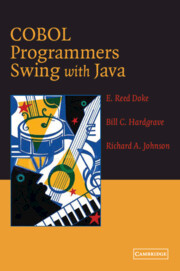Book contents
- Frontmatter
- Contents
- Preface
- Introduction
- Chapter 1 Why You Should Learn Java
- Chapter 2 An Introduction to Object-Oriented Programming
- Chapter 3 Java Structure
- Chapter 4 Defining Data
- Chapter 5 Computation
- Chapter 6 Decision Making
- Chapter 7 Loops
- Chapter 8 Arrays
- Chapter 9 Data Access
- Chapter 10 Graphical User Interfaces
- Chapter 11 Object-Oriented Development Issues
- Glossary
- Index
Chapter 7 - Loops
Published online by Cambridge University Press: 26 August 2009
- Frontmatter
- Contents
- Preface
- Introduction
- Chapter 1 Why You Should Learn Java
- Chapter 2 An Introduction to Object-Oriented Programming
- Chapter 3 Java Structure
- Chapter 4 Defining Data
- Chapter 5 Computation
- Chapter 6 Decision Making
- Chapter 7 Loops
- Chapter 8 Arrays
- Chapter 9 Data Access
- Chapter 10 Graphical User Interfaces
- Chapter 11 Object-Oriented Development Issues
- Glossary
- Index
Summary
OBJECTIVES
In this chapter you will study:
while loop;
do loop;
for loop;
Nested loops;
break statement; and
continue statement.
This chapter shows you how to write Java loops. You will learn how to write loops that mirror the familiar COBOL PERFORM statement including the PERFORM—UNTIL, PERFORM—VARYING—UNTIL and PERFORM—VARYING—UNTIL—AFTER. You will see that Java has three different types of loops: while, do, and for. We will use each of these to duplicate the work done by the COBOL PERFORM statement. In addition, we will review loops that test for the terminating condition at the beginning and at the end of the loop. We will also demonstrate writing nested loops in Java.
The chapter begins with the simple COBOL PERFORM—UNTIL statement and shows you how to accomplish the same thing in Java. Then we work with the PERFORM—VARYING—UNTIL and finally the PERFORM—VARYING—UNTIL—AFTER statement. Working programs are developed to illustrate the Java loop statements in action. At the end of the chapter, we design and develop a small program for the Community Naitonal Bank to compute a loan amortization, using some of the Java looping statements.
This chapter assumes you understand the following:
COBOL:
Perform-until
Inline perform (COBOL-85)
Perform-varying-until
Perform-varying-until-after
With test after (COBOL-85)
Java:
OO concepts (Chapter 2)
Java program structure (Chapter 3)
Defining data (Chapter 4)
Arithmetic (Chapter 5)
Decision making (Chapter 6)
LOOP STRUCTURE
We write program loops to repeat a sequence of instructions.
- Type
- Chapter
- Information
- COBOL Programmers Swing with Java , pp. 129 - 150Publisher: Cambridge University PressPrint publication year: 2004



